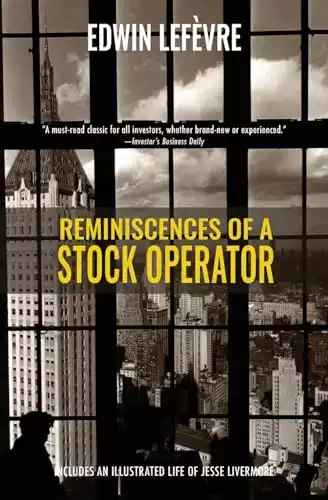Overview : Reminiscences of a Stock Operator
- Book Title: Reminiscences of a Stock Operator
- Author: Edwin Lefèvre
- Publication Date: 1923
- price: $13.20
- Pages: 269
Overview of the Book
"Reminiscences of a Stock Operator" was written by Edwin Lefèvre, a journalist and writer renowned for his deep insights into Wall Street. The book is a semi-autobiographical work inspired by the life of Jesse Livermore, one of the greatest stock traders of all time.
Introduction
In the vast library of investment literature, "Reminiscences of a Stock Operator" by Edwin Lefèvre stands as a cornerstone text that has withstood the test of time. First published in 1923, this semi-fictional biography of legendary trader Jesse Livermore (thinly veiled as Larry Livingston) offers readers a captivating journey through the early 20th-century stock market. Nearly a century later, its insights into market psychology, trading strategies, and the human condition continue to resonate with investors and traders alike.
Book Summary
"Reminiscences of a Stock Operator" chronicles the career of Larry Livingston, from his humble beginnings as a quotation-board boy in bucket shops to his rise as one of the most prominent speculators on Wall Street. Through Livingston's experiences, Lefèvre paints a vivid picture of the stock market's evolution, from the bustling trading floors to the advent of ticker tape technology.
The narrative unfolds as a series of lessons learned through triumphs and failures, offering readers a front-row seat to the emotional rollercoaster of trading. Livingston's journey is marked by spectacular wins and devastating losses, each serving as a teachable moment about market dynamics, risk management, and the psychology of trading.
Analysis of Themes
Market Psychology
One of the book's most enduring contributions is its deep dive into market psychology. Lefèvre masterfully illustrates how emotions like greed, fear, and hope can cloud judgment and lead to irrational decision-making. This exploration of behavioral finance, avant la lettre, remains remarkably relevant in today's markets, where algorithmic trading coexists with human emotion.
"The market does not beat them. They beat themselves, because though they have brains they cannot sit tight."
Trading Principles
The book outlines several timeless trading principles that continue to guide investors today:
- The importance of patience and "sitting tight" when you have a strong position
- The necessity of cutting losses quickly
- The value of learning from mistakes and maintaining discipline
- The significance of understanding market trends and sentiment
Risk Management
Livingston's experiences underscore the critical importance of risk management in trading. The book vividly illustrates how overleveraging and failure to manage risk can lead to financial ruin, a lesson that remains paramount in today's complex financial landscape.
Writing Style
Lefèvre's prose is engaging and accessible, blending narrative flair with practical insights. The book reads like a novel, making complex financial concepts digestible for a broad audience. This approachable style has contributed significantly to the book's enduring popularity among both seasoned investors and newcomers to finance.
Strengths and Weaknesses
Strengths:
- Timeless insights into market psychology and human behavior
- Engaging narrative that makes financial concepts accessible
- Rich historical context of early 20th-century Wall Street
- Practical trading wisdom applicable to modern markets
Weaknesses:
- Some outdated references to specific market mechanisms
- Lack of discussion on modern financial instruments and technologies
- Potential glamorization of speculative trading
Comparison to Other Works
While "Reminiscences of a Stock Operator" focuses on speculative trading, it's often compared to Benjamin Graham's "The Intelligent Investor" for its enduring influence on investment philosophy. However, where Graham advocates for a more conservative, value-based approach, Lefèvre's work delves into the psychology and tactics of active trading.
In the realm of trading psychology, "Trading in the Zone" by Mark Douglas offers a more modern take on the mental aspects of trading, building upon many of the principles first introduced in Lefèvre's work.
Relevance to Modern Investing
Despite the significant changes in financial markets since its publication, many of the book's lessons remain strikingly relevant:
- The importance of understanding market sentiment in an age of social media-driven trends
- Risk management principles that apply to modern instruments like cryptocurrencies and derivatives
- The enduring role of human psychology in markets, even as algorithmic trading becomes more prevalent
- The value of adaptability and continuous learning in rapidly evolving financial landscapes
Highlights from Reminiscences of a Stock Operator
- Autobiographical insights: Follows the life of a stock market speculator, capturing his strategies and experiences.
- Market psychology: Explores the emotional aspect of trading, including fear, greed, and market manipulation.
- Speculative tactics: Highlights short-term trading methods, including market timing and trend analysis.
- Lessons from losses: Focuses on learning from mistakes and understanding market cycles.
- Trader’s mindset: Emphasizes the importance of discipline, patience, and emotional control in trading.
- Stock market philosophy: Provides timeless wisdom on market speculation and risk management.
Conclusion
"Reminiscences of a Stock Operator" is more than just a historical account of early 20th-century trading; it's a timeless exploration of market dynamics and human nature. Its insights into trading psychology, risk management, and market behavior continue to offer valuable lessons for modern investors navigating today's complex financial world.
Whether you're a seasoned trader, a long-term investor, or simply curious about the psychological underpinnings of financial markets, this book offers a wealth of knowledge that has stood the test of time. Its enduring popularity is a testament to the universal truths it reveals about markets and human behavior.





